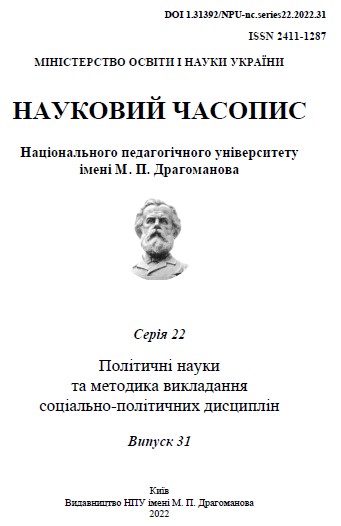PRIORITY OF THE CIVIL COMPONENT AS CONDITIONS FOR STRENGTHENING SUBJECTIVITY OF UKRAINE
DOI:
https://doi.org/10.31392/NPU-nc.series22.2022.31.04Keywords:
subjectivity, humanistic subjectivity, sovereignty, civil society, national identity, toleranceAbstract
The phenomenon of the subjectivity of the country is studied. It is argued that without internal content, namely, subjectivity, state sovereignty is formal. It is noted that there are different types of subjectivity. Criteria for the selection of which can be both quantitative and qualitative indicators. Among others, they note the strong and weak subjectivity, minimum and maximum, as well as authoritarian and humanistic. These characteristics can be combined. It is argued that there are factors that can strengthen a country's subjectivity. After all, "true" subjectivity, at least humanistic, is formed mainly due to internal factors and internal potential of the country, its opportunities for self-development and innovation. And, to a lesser extent, due to external influences and the tendency to "expand" their own national interests to other countries. The latter characterizes authoritarian subjectivity. It is noted that humanistic subjectivity is inherent in Ukraine, which, in particular, is based on educational culture and ethics. Therefore, Ukrainian society is inclined to self-development and innovation. It is argued that, in fact, civil society in general is an important basis and a key factor in shaping the subjectivity of the country. Promotes the formation of non-linear and horizontal ties, a culture of trust and tolerance between members of society. The latter, in turn, become independent subjects of socio-political processes and their subjectivity strengthens the subjectivity of the country. Promotes the formation of non-linear and horizontal ties, a culture of trust and tolerance between members of society. The latter, in turn, become independent subjects of socio-political processes and their subjectivity strengthens the subjectivity of the country. It is noted that the priority of the Ukrainian government should be to promote the development of civil society, which, supplementing the state and filling it with content, will give impetus to the subjective formation of Ukraine in foreign policy, to realize its own national interests. Emphasis is placed on the fact that in modern Ukrainian society there are positive changes towards the practices of trust, tolerance, solidarity and responsibility, confirmed by the findings of sociological research. Therefore, the prospects for the development of the civic component in strengthening the subjectivity of Ukraine are very positive.

